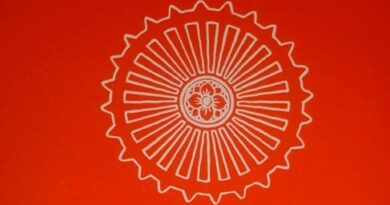Ten Defeats
MAIN CONTENT
Ten defeats
(Dasa pariji or dasa nāsana)
Anujānami bhikkhave, dasahaugehi samannāgatan sāmaueran nāsetun, pāuātipātī hoti, adinnādāyī hoti, abbrahmacārī hoti, musāvādī hoti, majjapāyī hoti, Bhuddhassa avauuam bhāsati, Dhammassa avauuam bhāsati, Sanghassa avauuam bhāsati, micchādhiIIhiko hoti, Bhikkhunīdūsako hoti, anujāmi bhikkhave, imehi dasahaugehi samannāgatan sāmaueran nāsetun.
Meaning:
Bhikkhus! I declare ten reasons for defeating sāmacera status. Does he kill living beings, does he steal, does he indulge in sex, does he lie, does he consume intoxicants, does he talk ill of the Buddha, does he talk ill of the Dhamma, does he talk ill of the Sangha, has he taken a wrong belief, does he rape bhikkhunīs, I declare that this sāmacera should be banished.
Sanvāsanāsanāya (prevention of association) – linganāsnāya (banishing from bhikkhu status) – danaakammanāsanāya (meting out punishments) are given as the three nāsanā in the description of kaniaka precepts of the vinaya commentaries. What is meant here is linganāsanāya. That is banishing from bhikkhu status. Becoming banishable from bhikkhu status is pārājikā (defeat). Therefore, dasanāsanā is also called dasa pārājikā.
The matters concerning five of the nāsanānga (factors of defeat) namely, killing animals, stealing, sexual activity, lying and consuming intoxicants are connected with the first five sāmacera precepts. Transgression by an upasampanna bhikkhu of precepts such as killing living beings will result in an offence one by one separately. For sāmaceras, there is no separate offence from precept to precept. If any one of the first five precepts is transgressed, the entire sāmacera sīla from refuge in the triple gem onwards becomes invalid. This will also invalidate the preceptor dependence. He will also lose the senāsana he had earlier. If it is the time of rains he will break the rains. He will be left with only the robe. The sāmacera so defeated should be given refuge in the triple gem, if he admits the offence and indicate willingness to re-enter. Must be made to undertake the precepts and dependence must be restored. If a sāmacera does not restrain himself and commit the offence repeatedly several times, the community of sangha must be informed and the person disrobed. If he returns after correcting himself and request pabbajja, he should be ordained after informing the community.
Teacher and preceptor should warn a sāmacera who talks ill of the Buddha, Dhamma or sangha. If the sāmacera then becomes, disciplined, he should be made to accept the offence and refuge in the triple gem given again. Precepts must be given. If he does not discard this tendency, he should be disrobed and banished. The same procedure should be followed regarding the taking of wrong view. Raping a bhikkunī is a serious offence. A sāmanera who has done it cannot receive pabbajja or higher ordination. He should be disrobed and sent away. Even a layman who has done it becomes unsuitable for pabbajja or higher ordination. Raping of bhikkhunīs, though belonging to abbrahmacariyā is decreed as a separate factor of defeat because it is very serious in nature.



